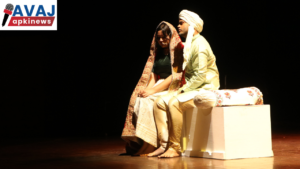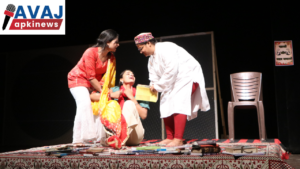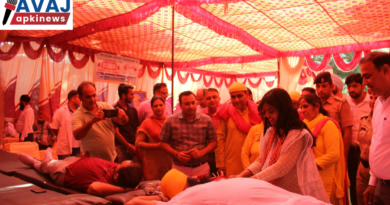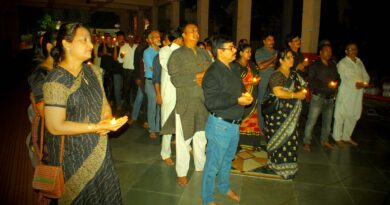Dr. Dharamvir Bharti’s “Suraj Ka Satwa Ghoda” Comes to Life at Shoolini Theatre Festival
The much-awaited Shoolini Theatre Festival brings stories to life and showcases the art of storytelling through a riveting adaptation of Dharamvir Bharti’s – The Seventh Horse of the Sun.
Chandigarh, May 16,2023: ( AVAJ APKI NEWS )



Shoolini University’s Annual Theatre Festival showcased a riveting adaptation of Dharamvir Bharati’s “The Seventh Horse of the Sun” at Tagore Theatre, Sector 18 here today. The play explored three love stories from Dr. Bharti’s short novel, “Suraj Ka Satwa Ghoda.”
The theatre show was a unique interpretation of the stories of Jamuna, Lily, and Satti, and highlighted the themes of safe spaces for women, mutual respect, and social imbalances.
The performance, which was witnessed with rapt attention in the packed theatre, received a standing ovation by the audience.
Well known theatre director Neelam Mansingh Chowdhry was the chief guest while the Director, Punjab Engineering College, Dr Baldev Setia was the guest of honour. Several prominent personalities watched the spell binding performance.
The play was directed by Ankur Bashar, an international performer thespian, director, voice coach, performance artist, poet, and playwright, who is currently an Assistant Professor for Performing Arts at Shoolini University. Sharing his thoughts on the production, he said all the stories selected “are purpose-driven, and it’s not about the applause and appreciation only, but about making a point. Our theatre language at Shoolini Creative Studio finds its etymology deeply rooted in the area of realization, passion, and commitment” and added that “one needs to be fearless and audacious to bring an honest vision to life.”
The adaptation of “The Seventh Horse of the Sun” was a testament to the talent and creativity of the students and faculty of Shoolini University. By providing a platform for theatre artists to showcase their skills and express their artistic vision, the Annual Theatre Festival continues to be an important event for the university and the local community.
The theatrical performance featured a talented star cast that included Khushi Goswami, Vibhuti Sharma, Aparajitaa Sinha, Sujit Nandi, Avishek Mandal, Muskan Thakur, Raghav Kapoor, Ved Prabhas, Ankit Sharma, Taranveer Sandhu, Palak Jain, Khushboo Giri, and Sapna. The Sound Operation was deftly handled by Vasundhara Laxmi, while Shibani Bose’s stunning Costume Design added to the visual spectacle of the show.
The Poster, Invite, and Brochure were creatively designed by Joshua and team, and the set construction was executed flawlessly by Aman. The production aimed to reflect the developing culture of Shoolini University and its commitment to education as a tool for transformation.
The makers of the play expressed their heartfelt gratitude to the individuals who supported and contributed to the success of the production.
About The Play
———————
There are three stories in the short novel ‘Suraj Ka Satwa Ghoda’ by Dr. Dharamvir Bharti: one of Jamuna, the other of Lily, and the third of Satti. All these three stories are ‘love stories,” in the words of Manik Mulla, which Manik Mulla narrated to his friends in six afternoons.
The entire story of Suraj ka Saatwa Ghoda is arranged in seven sections. On summer afternoons, Manik Mulla’s friends gather at his house, and Manik Mulla tells a story to his friends every afternoon. In the words of Manik Mulla, these are the love stories that interest most people. In seeing and hearing these stories, love stories seem like a means of entertainment, but in reality, these are the pictures of the lower middle class in our society. Their life situations, their aspirations, their means, and their compulsions are all expressed through these stories. ‘Seven afternoons’ or ‘seven chapters,” arranged in seven chapters, are preceded by ‘upodghat,” in which the narrator of the story, Manik Mulla, is introduced. The techniques of the story and the indications of his understanding of politics, society, psychology, etc. are also in this ‘subtext’.




